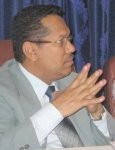 Almotamar.net
Almotamar.net - Member of the General Committee of the General People's Congress (GPC), the Head of Mass Organisations at the party Dr Ahmed Ubaid Bin Daghr affirmed that the major part of the elections law had been agreed on and was finalized jointly with the GPC and the Joint Meeting Parties (JMP) in a dialogue conducted between them, which is still going on, but said the GPC would not continue it indefinitely.
While Bin Daghr stressed the necessity that the dialogue between the GPC and the JMP should be clear and open and its agenda and topics clear for the people, he criticised the JMP"s rejection of all the GPC"s offers and suggestions concerning the formation of the Supreme Commission for elections.
In an interview Al-Siyasa newspaper published Sunday, the GPC leading member said sometimes the JMP shuns dialogue for realising some gains but it soon returns to the dialogue table. He pointed out that the JMP prefers dialogue among closed walls and that they have strong sensitivity regarding clarity, frankness and transparency of which they talk in their media and addresses but in practice they prefer darkness and seek for deals.
Bin Daghr also talked about the GPC"s proposals regarding the formation of the elections commission saying at the beginning was the idea of the JMP to form it from judges and the GPC accepted it and then it was signed in the agreement of principles in 2006 but after that the JMP backed down from it.
Bin Daghr has further said that to avoid keeping this matter an object of difference in relations between the GPC and the JMP, the first offered other suggestions. It proposed the formation of the elections commission according to parties' representation at the parliament but this idea was also refused by the JMP. The GPC then suggested to the JMP the nomination of 4 members for the supreme commission for election out of 9 and the GPC nominates other 4 members and the president of the republic to appoint chairman of the commission. He said this idea was not accepted by the JMP, affirming that the GPC always seeks finding solutions and offers proposals but always faced with refusal by the JMP.

